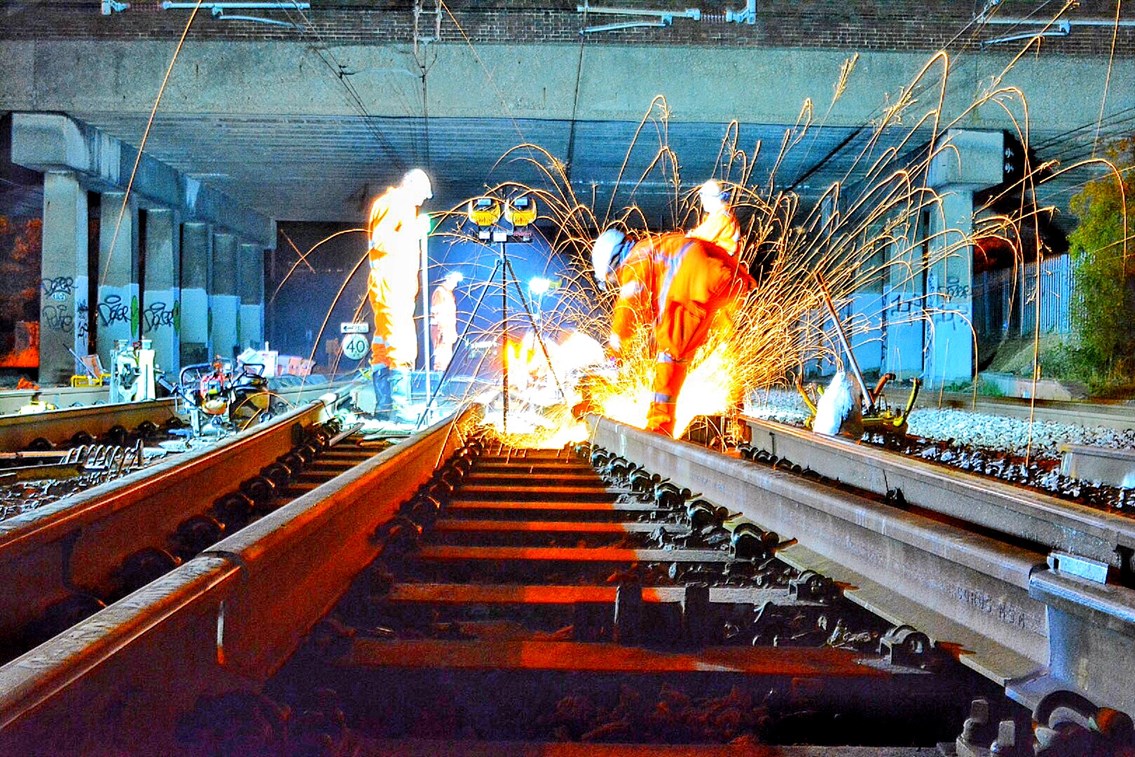Wednesday 19 Jul 2017
Record investment in improving the railway and improved safety record at the centre of Network Rail's year
- Region & Route:
- National
- Record £3.9bn spend on enhancements
- Exceptional safety record continues
- Reliability and performance of infrastructure assets now best on record
- Cost efficiencies remain challenging
- Train performance below industry expectations owing to increased congestion, severe weather and industrial action
A record £3.9 billion was spent on enhancing Britain’s railway last year, 10 percent more than in any previous year, according to Network Rail’s annual report published today. Almost all significant project milestones were met, although two were not – Gospel Oak to Barking electrification, and one on the Edinburgh to Glasgow improvement project. The report also highlights that the company’s exceptional safety record has continued to improve in both workforce and passenger safety.
In 2016/17 there was a renewed focus on transforming Network Rail into a more customer-focussed, cost competitive organisation. The benefits of devolution have started to be realised in the last year, with significant additional responsibility now being exercised by the nine route managing directors and their leadership teams. This has resulted in greater accountability with more decisions being made at a local level.
Route performance targets are now developed with train operating companies, and the first ever route supervisory board was launched, bringing train and track closer together to deliver for passengers.
Nearly a quarter of the UK’s total spend on infrastructure is being delivered through Network Rail on its Railway Upgrade Plan. This has seen strong progress this year including:
- In August, the first part of the new London Bridge station concourse was opened, which was constructed whilst the station remained open for the 50 million passengers who use it every year.
- In September, the Dover-Folkestone railway was reopened three months ahead of schedule. The sea wall at Dover, along with 250 metres of track, collapsed in the Christmas Eve storms of 2015 and it took 200 people and more than 90,000 tonnes of rock to re-build.
- In December, the first new rail link between a major British city and London in more than 100 years was completed, with the opening of the Oxford-Marylebone line.
The reliability and performance of our infrastructure assets improved further this year and is now the best on record. But for a number of reasons including increasing congestion, severe weather and industrial action, train performance as a whole has not been what the industry would have liked.
Cost efficiency remains a challenge for Network Rail, largely due to increased supply chain costs compared to regulatory assumptions in 2012, as well as much less access to the railway than was assumed then given the rapid rise in early morning and late night trains. The Board has put in place a plan to ensure the organisation keeps within its financial budget for the remainder of the control period which will see some non-essential renewals work postponed. The company is also further reviewing its plans for the next control period (CP6) to better understand where further efficiencies can be made.
The annual report identifies progress in the Digital Railway programme, outlining that where digital solutions have the potential to significantly increase much needed capacity on Britain’s railways, business cases have been developed.
Sir Peter Hendy CBE, chair said: “Britain’s railways create growth, jobs and housing through connectivity; they are a remarkable success story. We have seen the greatest passenger growth in the last ten years of any European country and we are also Europe’s safest major railway.
“I am very proud of the efforts of Network Rail’s teams and contractors across the country, who work relentlessly to deliver a better railway for the millions of passengers who rely on us every day.
“The extraordinary growth in passenger numbers means the network is now full in many areas, and this congestion inevitably increases delays when anything goes wrong. It has also meant we have less access than ever before to make essential improvements. We are leading the way the whole rail industry operates in the years ahead, by both embracing new technologies and working ever more closely together to deliver the most effective and efficient outcomes for passengers. But there is much more to do to deliver the affordable and reliable railway our country needs."
Contact information
Passengers / community members
Network Rail national helpline
03457 11 41 41
Latest travel advice
Please visit National Rail Enquiries
Journalists
Network Rail press office -Grete Luxbacher
Senior media relations manager
Network Rail
020 3356 8700
07710 959721
grete.gogay@networkrail.co.uk
About Network Rail
We own, operate and develop Britain's railway infrastructure; that's 20,000 miles of track, 30,000 bridges, tunnels and viaducts and the thousands of signals, level crossings and stations. We run 20 of the UK's largest stations while all the others, over 2,500, are run by the country's train operating companies.
Usually, there are almost five million journeys made in the UK and over 600 freight trains run on the network. People depend on Britain's railway for their daily commute, to visit friends and loved ones and to get them home safe every day. Our role is to deliver a safe and reliable railway, so we carefully manage and deliver thousands of projects every year that form part of the multi-billion pound Railway Upgrade Plan, to grow and expand the nation's railway network to respond to the tremendous growth and demand the railway has experienced - a doubling of passenger journeys over the past 20 years.
Follow us on Twitter: @networkrail
Visit our online newsroom: www.networkrailmediacentre.co.uk

